
DRUG SAFETY
Scope & Guideline
Transforming Knowledge into Safer Therapeutics
Introduction
Aims and Scopes
- Pharmacovigilance and Drug Safety Monitoring:
This area covers the systematic collection, analysis, and interpretation of data related to adverse drug reactions (ADRs) and other drug-related problems. It aims to improve safety and efficacy in drug use through ongoing monitoring. - Risk Assessment and Management:
Research focusing on identifying, assessing, and managing risks associated with drug therapies, including the development of frameworks for safer medication use in various populations. - Real-World Evidence and Data Analysis:
Utilizing real-world data sources to analyze drug safety outcomes, effectiveness, and patterns of drug usage. This includes studies using electronic health records and spontaneous reporting systems. - Methodological Innovations in Drug Safety Research:
Development of new methodologies and technologies (e.g., machine learning, big data analytics) for signal detection and causal inference in pharmacovigilance. - Patient-Centric Approaches to Drug Safety:
Research that emphasizes the role of patients in pharmacovigilance, including patient-reported outcomes and experiences related to drug safety. - Special Populations and Vulnerable Groups:
Studies focusing on drug safety in specific populations, such as pregnant women, children, and the elderly, to address unique safety concerns and ensure tailored risk management.
Trending and Emerging
- Integration of Artificial Intelligence and Machine Learning:
There is a growing emphasis on the use of AI and machine learning technologies in pharmacovigilance for signal detection, data analysis, and improving reporting accuracy. - Focus on Vaccine Safety and Monitoring:
Following the COVID-19 pandemic, there has been a significant increase in research related to vaccine safety, particularly regarding the monitoring of adverse events associated with COVID-19 vaccinations. - Patient Engagement and Involvement:
Emerging research emphasizes the importance of involving patients in pharmacovigilance processes, including patient-reported outcomes and experiences, to enhance drug safety practices. - Real-World Data Utilization:
The use of real-world data for evaluating drug safety and efficacy is trending, with studies focusing on how these data can inform regulatory decisions and clinical practice. - Polypharmacy and Drug-Drug Interaction Studies:
Research addressing the complexities of polypharmacy and drug-drug interactions is gaining prominence, reflecting the need to understand safety in patients taking multiple medications. - Ethical Considerations in Pharmacovigilance:
Emerging discussions around the ethical implications of pharmacovigilance practices, particularly regarding data privacy and the responsibilities of stakeholders in drug safety.
Declining or Waning
- Traditional Pharmacovigilance Methods:
There is a noticeable decline in the publication of papers focusing solely on traditional pharmacovigilance methods, as newer technologies and data sources are increasingly prioritized. - General Drug Safety Studies Without Specific Contexts:
Research that lacks a specific context or fails to address contemporary issues in drug safety may be receiving less attention, as the emphasis shifts towards studies that are more relevant to current healthcare challenges. - Single-Agent Drug Studies:
Studies focusing solely on the safety of single agents without considering polypharmacy or drug-drug interactions are becoming less prominent, reflecting a broader understanding of the complexities of real-world medication use. - Pharmacovigilance in Low-Resource Settings:
While still important, the specific focus on pharmacovigilance in low-resource settings may be waning as the journal expands its scope to include more global and comprehensive approaches.
Similar Journals
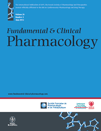
FUNDAMENTAL & CLINICAL PHARMACOLOGY
Advancing pharmacological knowledge for better health outcomes.FUNDAMENTAL & CLINICAL PHARMACOLOGY is a distinguished journal dedicated to advancing the fields of pharmacology and clinical medicine. Published by WILEY, this journal serves as a pivotal platform for researchers, healthcare professionals, and students alike to disseminate innovative research findings and clinical applications. With an impressive history spanning from 1987 to 2024, it has consistently maintained its relevance in the scientific community, evidenced by its Q2 quartile ranking in both Pharmacology and Pharmacology (medical) categories for 2023. The journal's diverse publication range, which includes original research articles, reviews, and clinical studies, helps bridge the gap between fundamental research and practical application in healthcare settings. Although it does not offer open access, its rigorous peer-review process ensures that published content meets the highest scholarly standards, making it a vital resource for those aiming to stay at the forefront of pharmacological sciences.
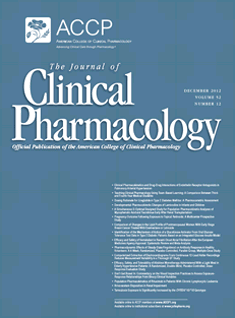
JOURNAL OF CLINICAL PHARMACOLOGY
Innovating Insights in Clinical PharmacologyWelcome to the Journal of Clinical Pharmacology, an esteemed publication in the field of pharmacology and medical pharmacology, published by Wiley. Since its inception in 1973, this journal has been at the forefront of disseminating innovative research findings and comprehensive reviews that enhance our understanding of drug therapies and their clinical applications. With an impact factor that reflects its strong reputation and a Scopus ranking placing it in the 64th percentile among 272 journals in medical pharmacology, the journal stands as a critical resource for researchers, healthcare professionals, and students alike. Although currently not an Open Access journal, it provides invaluable insights into therapeutic drug use and safety, the pharmacokinetics of drugs, and the development of new therapeutic strategies. The journal's commitment to advancing the field through high-quality, peer-reviewed articles ensures it remains a vital asset in the continuously evolving landscape of clinical pharmacology.

Drugs-Real World Outcomes
Transforming pharmacological research into practical solutions.Drugs-Real World Outcomes, published by SPRINGERNATURE, is an influential open access journal dedicated to the dissemination of research concerning the real-world impact of pharmacological therapies. Since its inception in 2014, this journal has established a significant presence in the field of Pharmacology, evidenced by its classification in the Q2 quartile for 2023 and a Scopus rank of #141 out of 272 in the medical pharmacology category, placing it in the 48th percentile. The journal’s scope encompasses a diverse range of studies aimed at bridging the gap between clinical research and practical outcomes, making it an essential resource for researchers, healthcare professionals, and students alike. Located in Switzerland, Drugs-Real World Outcomes allows researchers unfettered access to vital data, enhancing knowledge translation and improving health care practices. As it continues to evolve, the journal remains committed to fostering high-quality research that informs and advances the field of pharmacological therapies.
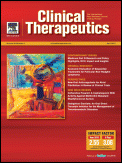
CLINICAL THERAPEUTICS
Exploring the intersection of research and clinical excellence.Clinical Therapeutics, published by Elsevier, is a highly esteemed peer-reviewed journal that has been pivotal in advancing the field of pharmacology since its inception in 1977. With an impressive impact factor and recognition as Q2 in Pharmacology and Q1 in Medical Pharmacology for 2023, it stands at the forefront of research and discussions on innovative therapeutic strategies and pharmacological advancements. This journal not only caters to a broad audience of researchers and clinicians but also plays a vital role in disseminating critical information that supports the enhancement of patient care and safety. As a repository of high-quality, evidence-based articles, Clinical Therapeutics is a crucial resource for those involved in drug development, medical research, and clinical practice, making it an essential read for anyone dedicated to improving health outcomes through pharmaceutical sciences.
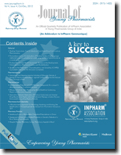
Journal of Young Pharmacists
Elevating Young Researchers in the Pharmaceutical RealmJournal of Young Pharmacists is a distinguished peer-reviewed journal published by INPHARM ASSOCIATION in collaboration with PHCOG NET. With an ISSN of 0975-1483 and an E-ISSN of 0975-1505, this journal serves as a vital platform for disseminating pioneering research in the field of pharmacology and toxicology. Although coverage in Scopus was discontinued in 2018, the journal continues to be important in educating future pharmacists and advancing the discipline, evident from its ranking in the 29th percentile among general pharmacology journals. The Journal of Young Pharmacists seeks to bridge the gap between theoretical knowledge and practical application, encouraging young researchers, professionals, and students to contribute their insights and findings. The journal emphasizes innovative approaches and contemporary issues relevant to the pharmaceutical sciences, making it an invaluable resource for anyone involved in this dynamic field.
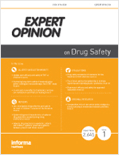
Expert Opinion On Drug Safety
Exploring the Nuances of Adverse Effects and Risk ManagementExpert Opinion on Drug Safety is a prestigious academic journal dedicated to advancing knowledge in the fields of drug safety and pharmacology. Published by Taylor & Francis Ltd, this journal serves as an essential resource for researchers and professionals seeking to explore the complexities of drug interactions, adverse effects, and risk management. With an impressive impact factor and recognized as a Q1 journal in both the Medicine (Miscellaneous) and Pharmacology (Medical) categories, it ranks favorably at #78 out of 272 in Scopus, placing it in the 71st percentile among its peers. Operating under a rigorous peer-review process, the journal publishes original research, expert reviews, and opinion pieces that contribute to a deeper understanding of drug safety practices. While not an open access journal, it remains a vital platform for disseminating pivotal findings and fostering scholarly dialogue, ensuring that critical insights reach a global audience. With continuous publication from 2002 to 2024, Expert Opinion on Drug Safety is a key reference for anyone involved in pharmaceutical research, healthcare practice, or drug regulation.

Pharmaceutical Medicine
Advancing the frontiers of pharmacological research.Pharmaceutical Medicine is a leading journal published by SPRINGER INT PUBL AG, dedicated to the field of pharmacology and pharmaceutical sciences. With ISSN 1178-2595 and E-ISSN 1179-1993, this journal serves as an essential platform for researchers and professionals to share groundbreaking findings and advancements in medication efficacy, safety, and innovative therapeutic strategies. Recognized for its contribution to the field, Pharmaceutical Medicine holds an impressive Q2 ranking in both Pharmacology and Medical Pharmacology categories, further underscored by its competitive Scopus rankings—positioned at 100/272 (63rd percentile) in Medical Pharmacology and 156/313 (50th percentile) in Pharmacology, Toxicology, and Pharmaceutics. Although it primarily operates on a traditional subscription basis, its robust academic reputation continues to attract a diverse readership worldwide. Addressed in the United Kingdom with facilities in Switzerland, the journal publishes authoritative articles from its inception in 2000 through to 2024, making it a pivotal resource for those seeking to enhance their understanding and application of pharmacological principles in clinical practice and research.
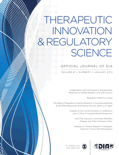
Therapeutic Innovation & Regulatory Science
Unveiling the Future of Pharmacology and Public HealthTherapeutic Innovation & Regulatory Science, published by Springer Heidelberg, is an esteemed journal that focuses on the intersection of therapeutic innovations and the regulatory frameworks that govern them. Established in 1970 and continuing its legacy of excellence through converged years, this journal plays a crucial role in supplying cutting-edge research, reviews, and discussions that advance understanding in the fields of pharmacology and healthcare regulation. With an impact factor reflective of its rigorous peer-review standards, this journal holds a prestigious Q1 ranking in Pharmacology, Toxicology, and Pharmaceutics (Miscellaneous) for 2023, reflecting its influence and the high quality of its published material. The journal's wide scope also embraces public health and environmental studies, making it an essential resource for researchers and professionals navigating these critical areas. Open access options enhance its visibility and accessibility, ensuring that the latest discoveries and regulatory insights are readily available to a global audience. For those at the forefront of medicinal science and regulatory affairs, Therapeutic Innovation & Regulatory Science is your avenue to understanding pivotal innovations that shape contemporary therapeutic practices.

Iranian Journal of Pharmaceutical Research
Fostering a vibrant community of pharmaceutical researchers.Welcome to the Iranian Journal of Pharmaceutical Research, a pioneering publication in the field of pharmacology, toxicology, and pharmaceutics, published by BRIEFLAND. Established in 2002, this journal has been a crucial platform for disseminating innovative research and scholarly articles, contributing significantly to the advancement of pharmaceutical sciences in Iran and beyond. With an impressive trajectory leading towards a convergence of knowledge by 2024, it proudly holds a Q3 ranking in Pharmacology (Medical) and a Q2 ranking in the broader realm of Pharmacology, Toxicology, and Pharmaceutics for 2023. The journal's influence is underscored by its Scopus rank of #25/80 in General Pharmacology, Toxicology, and Pharmaceutics, placing it within the 69th percentile, therefore appealing to researchers, professionals, and students alike. Although the journal operates under a non-open access model, it remains dedicated to providing high-quality research articles that explore the latest advancements in pharmaceutical sciences, making it an essential resource for anyone involved in this vibrant field of study.

International Journal of Clinical Pharmacy
Advancing Clinical Pharmacy Knowledge for Global ImpactThe International Journal of Clinical Pharmacy, published by Springer, serves as a pivotal platform for advancing research in the fields of Pharmaceutical Science and Pharmacology. This esteemed journal, recognized for its significant impact with an impressive Q1 ranking in Pharmacy and multiple Q2 designations, provides a dedicated space for scholars and practitioners to share innovative findings and methodologies that enhance clinical pharmacy practices. With an international reach and publication spanning from 2011 to 2024, the journal aims to facilitate knowledge exchange among researchers, professionals, and students, ultimately contributing to improved therapeutic outcomes. As an open-access journal, it promotes widespread dissemination of vital research, ensuring that cutting-edge clinical pharmacy knowledge is accessible to all stakeholders in the healthcare continuum.